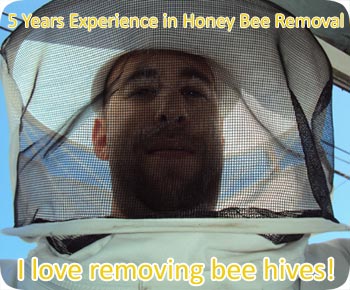
| Home Page | Boca Raton | Miami | Palm Beach | Coral Springs | Photographs | Contact Us |
Palm Beach Bee Removal
| Hello! My name
is Patrick, and I specialize in the removal of honey bee hives from homes
and other buildings. I am based in Palm Beach, Florida, and
service most of southeast FL, including Palm Beach, Fort Lauderdale and Miami. I operate a fully licensed and insured pest control business in the state of Florida. I have the best bee removal equipment and training available, and I have the best insurance and licensing available as well. I have a great advantage over the large pest control firms - first of all, I do better work than them, hands down. If you hire a big bug company, you'll get an underpaid employee who doesn't really care of the job is done right. If you hire me, I will arrive at your house, and do the job correctly and professionally, from start to finish. I have 5 years of bee removal experience, and I am available 24 hours a day, 7 days a week. Give me a call! |  |
 | Superior Bee Removal: We have trained for years specially on bee control and hive removal. Our experience counts a great deal when it comes to properly understanding the species of bee, and the type of hive that you are dealing with. My knowledge of architecture means that I am specially prepared to properly disassemble the area in order to remove the hive in its entirety, and fix the open area afterward. Bees can live in walls, roofs, attics, chimneys, soffits, under decks, and several other areas. They can even live as a swarm outside of a building, and each different area requires a different approach in order to get the job done right. I have been known to remove some hives as high as 60 feet off the ground! Not every bee removal company can do that. But more importantly, not every bee removal company is owner-operated, providing both the best level of service, and competitive rates, below that of the big companies and their unmotivated employees. Give me a call at 954-756-7969, and we'll schedule an appointment. |

Bee Control News Clip: Local beekeeper advocates saving the honey makers The Palm Beach Bee Removal Pro’s calm is not one of a man about to approach 30,000 of nature’s most feared creatures. His hands are bare and steady. He kneels beside a swarm of honey bees huddled on a shrub in his lawn and boldly shakes the limbs, persuading the swarm into a safe wooden box. Once the queen heads inside, all her workers will take to the wooden hive in minutes so The Palm Beach Bee Removal Pro can take the runaway bees to a more secluded spot away from concerned neighbors. With the coming of spring, instincts are now telling bees to ditch their original hive with their queen and relocate – ending with a rise in sightings of swarms settling in mailboxes, barbeques and shrubbery. As one of the few self-proclaimed swarm catchers in the area, The Palm Beach Bee Removal Pro spends these months on-call removing swarms from frightened locals and spreading the word about saving bees. “All my life I’ve seen the value in what bees do for us, and without bees it’s going to be tough on the next generation,” he said. “When swarms come around people want to kill them, but no, just call me and I’ll save them.” As the founder of The Broward County Beekeepers Association and the Save Our Bees Squad, The Palm Beach Bee Removal Pro is the unofficial leader of the local beekeeping community. He’s also the only local beekeeper, outside of exterminators, to remove unwelcome swarms and relocate them to spots where they can reproduce in peace instead of killing them at first sight. February through May is the busy season for swarms, when queen bees lay the last of their eggs and flee their old hives. Nearly 60 percent of the bees in each hive will follow their queen on her way out, which means swarms of close to 30,000 bees zipping through neighborhoods to relocate. These swarms are unwelcome guests for most; especially since docile honey bees are often confused with their aggressive counterparts, the African honey bee. The Palm Beach Bee Removal Pro says people often rush for the can of repellant when they see a hive, contributing to the steady decline of bee populations in the state.